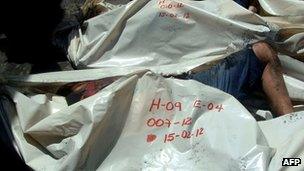Honduras prison fire: Tragedy repeats itself
- Published
Miguel Angel Manueles, an inmate at La Paz Penitentiary, shows the BBC how cramped the conditions are.
"Prisons here are time bombs," says one inmate in the Honduran National Penitentiary of La Paz with a resigned shrug.
It is hard to know whether he is referring to the growing resentment the inmates feel towards the authorities, or to the crumbling infrastructure inside the jail.
Certainly he and his fellow prisoners fear a repeat of the terrible events in the jail in nearby Comayagua - where a fire last Tuesday killed 355 people - could happen at any time in their cramped and overcrowded environment.
Although La Paz is much smaller than Comayagua, the problems are the same. There are 201 inmates in a space which was built for just 130. And there are serious problems with the supply of electricity, potable water and food.
"You never know with prisons here," says another prisoner, who later explained that he had family members who had perished in the Comayagua fire.
In fact, the more we asked around in the jail in La Paz, it appeared that everyone knew someone who had been affected.
The horrific events in Comayagua were not the first time in its recent history that Honduras has suffered such a tragedy.
Parallels
In May 2004, more than 100 inmates were killed in a blaze in a jail in San Pedro Sula. The similarities between the two events are striking, right down to the single word headline splashed across the country's main newspapers - eight years apart: "Horror."
Then, as now, the Honduran police blamed the fire on a short circuit. The families of inmates who died while trapped inside their cells accused the authorities of failing to act, or worse, of being complicit in their deaths.
There are also parallels in the political rhetoric.
In 2004, the government of then-President Ricardo Maduro promised a full and thorough investigation as well as a long overdue reform of the prison system. On Wednesday, current President Porfirio Lobo promised exactly the same.
But between the two events, there have been significant changes in Honduras. In particular, a sharp rise in drug-related violence has reached the point where today Honduras has the unenviable title of the country with the highest murder rate in the world.
But critics say the penal system has not adapted.
A "strong arm" has been the default response of successive governments to the rising tide of violent crime. But sending more young men to jail has put greater pressure on the already saturated prison system.
At least one minister who visited the site of the burnt-out jail at Comayagua was ready to admit that, in essence, the 355 men died needlessly.

Promises of penitential reform have followed previous tragic incidents
"That's why we need reform," said Public Works Minister Miguel Rodrigo Pastor, as the body bags were being loaded on to trucks behind him.
He admitted the penitential system needed reform. "It's urgent, and the government is aware of it."
He also spoke of the need to "guarantee the security of the inmates".
But critics believe the time for words is over.
A particularly vocal critic since the fire in San Pedro Sula has been the region's auxiliary bishop, Monsignor Romulo Emiliani.
"We must commit ourselves - at a national level, and before the physical remains of these poor humans who died in Comayagua - to immediately turning our best energies and funds to constructing new prison buildings," he said the day after the blaze.
"The world knows us for our tragedies," he added, saying a repeat of more deaths in this way - burned, asphyxiated and trapped - would not be tolerated.
Gang problem
Others suggest the problem runs deeper than simply the state of the prisons and is actually a problem of the antiquated and corrupt judicial system itself.
For example, it has been reported that as many as half of the inmates in Comayagua still had not been charged or were awaiting trial for alleged gang affiliations.
Honduras has a serious problem with powerful street gangs, known as maras. But some human rights groups say that many ordinary young men are being discriminated against and sent to jail.
One draconian law in Honduras permits people to be sent to prison merely for having a tattoo of a street gang.
In some jails, maras are essentially the ones in control.
Honduras is not a major producer of drugs, yet it is part of an important corridor for cocaine traffic from Colombia, through Mexico and into the United States. The influence of Mexican drug cartels is growing in Central America, and Honduras is a key battleground.
The government says its war on the drug gangs is its priority.
But with resources being diverted towards that battle, as well as serious problems with corrupt institutions at a local and national level, the wholesale prison reforms which President Lobo speaks of will not be easy to achieve.
So, even with the world watching Honduras and its jails, the inmates who showed us around the prison in La Paz are convinced nothing will change.
"The government and the media talk about it at times like this," a former gang member called James says.
"But the president needs to come down here and see for himself how we live."
- Published16 February 2012
- Published16 February 2012
- Published23 November 2011
- Published1 November 2011